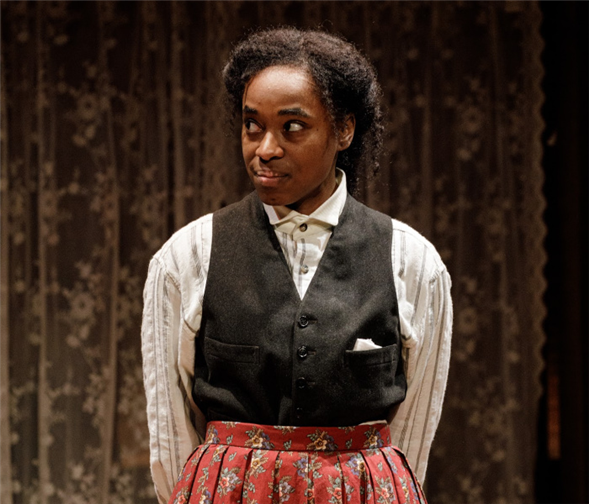Translate Page

How Kristolyn Lloyd creates a radically new yet completely authentic Jo in Little Women
In one of the most famous moments in Louisa May Alcott's beloved 19th-century novel Little Women, feisty Josephine March chops off and sells her long locks in order to send her destitute mother to Washington to visit the family's ailing patriarch, an officer in the Civil War. It's a pivotal scene in every screen and stage adaptation, but in Primary Stages' kinetic theatricalization of the story, Jo doesn't end up with the usual pixie 'do. She goes all in, with a short style that would have her contemporaries mistaking her for a young man. And that is exactly the point.
"I wanted to make sure that when Jo cuts her hair off, she's gonna cut it off!" says Kristolyn Lloyd, the 34-year-old actress playing Jo. "When black women cut their hair, it's a big chop -- it's not some cute little bob."
Lloyd's cropped Afro is one of many elements that sets her take on Jo apart from the ones that came before. The character has always been seen as the headstrong woman in this tale of four New England sisters trying to find their respective ways in an era when they had few options open to them. However, Lloyd's Jo isn't just determined, she radiates genuine boyishness. "I was very open to Kate and Sarna's interpretation," says Lloyd about the playwright, Kate Hamill, acclaimed for her stage adaptations of classic novels, and the director, Sarna Lapine. "Even in the audition I leaned on the masculine energy I possess," adds Lloyd, noting that she grew up roughhousing with her two brothers back in Texas. "My brothers are 6 and 10 years older than me, and we did a lot of riding bikes and getting messy. My mother was very Southern and prissy and didn't love that, but we didn't have electronics. We were told to just go out and play."
This rejection of how women were meant to act in mid-1800s society comes across in the way Lloyd's Jo walks, talks and dresses -- she's in men's clothes throughout the play, reluctantly adding a skirt when prodded. When one of her sisters hesitates to confide in Jo, saying she needs "a woman's perspective," Lloyd pulls up a chair and straddles it with all the feminine grace of John Wayne mounting a horse in spurs.
While cynics may gripe that playing Jo in this fashion is just a nod to current conversations about gender fluidity, Lloyd insists it's true to Alcott's intentions. "In Kate's research about Alcott, she found that the author didn't want Jo to get married!" says Lloyd, which explains why the character of Jo's eventual husband, Professor Bhaer, is absent from this adaptation. "It was at the publisher's insistence -- everyone was so disappointed that Jo and Laurie [a male friend of the Marches] didn't get together, so the compromise was to add Bhaer, who Alcott describes as an older, unattractive man."
Alcott herself never married nor had children. Jo, her alter ego, wouldn't have either if the author had gotten her way. That's why in this version, when Laurie tries to kiss Jo, she is visibly shaken, and not just because she thinks of him as a brother. It's made clear she's not romantically interested in men at all.
The fact that Jo is played by an African-American woman is never explicitly addressed in this color-blind cast. However, her heritage does give certain exchanges deeper resonance, such as when Jo stands up to a boorish relative who questions why the Marches' dad is bothering to fight for the Union. "Who cares if people are being enslaved?" asks an outraged Jo sarcastically. There are also debates about immigrants, and Jo even has her own #MeToo moment in a publisher's office.
"So much of this story is relevant to today," says Lloyd, a stage veteran who's best known for being part of the original Broadway cast of Dear Evan Hansen. "We're touching on themes of what it means to be a woman in the world, with your limited resources and support, and what does it look like to try to break through glass ceilings and break down walls." She sees the conflict between the Marches and their wealthier, more conservative relatives as shockingly current. "They're attempting to survive and love each other with the Civil War raging outside their home," she says. "We have a cyber political war going on today -- instead of bayonets and guns, it's people on their keyboards talking to each other online."
But this Jo is fighting back the best way she knows: through her writing. "It's been very surprising how comfortable it felt to me to slip into this role," Lloyd says. "It's hard for black women to get opportunities to do period pieces, to be in shows where it's complex and not all about your race. As an actor and writer myself, I immediately connected to Jo's need to be heard, and for people to not just put you in a box and say your stories should look one specific way."
To read about a student's experience at Little Women, check out this post on TDF's sister site SEEN.
---
TDF MEMBERS: At press time, discount tickets were available for Little Women. Go here to browse our current offers.
Marisa Cohen is a freelance writer in New York who can be heard singing show tunes with her two daughters at all hours of the day.
Top image: Kristolyn Lloyd in Little Women. Photos by James Leynse.